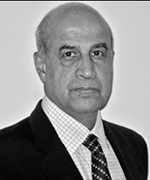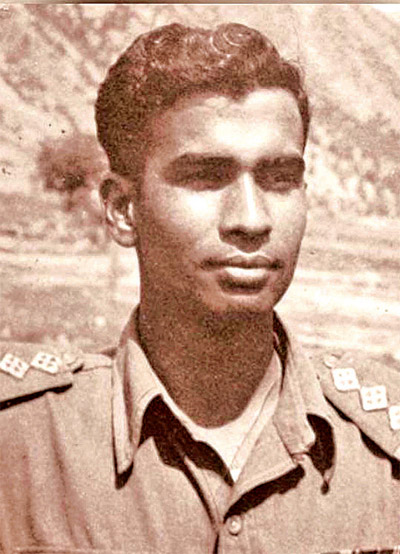A young army officer’s capture and escape from the Japanese in Burma during World War II
 Brig. Ravi Palsokar (retd)
Brig. Ravi Palsokar (retd)
In 1945 during the Second World War, Allied armies started closing in on victory though it is unlikely that this was apparent to the participants. In Burma, the Japanese were on the defensive with the 14th Army advancing towards Mandalay. Lt Gen. Bill Slim, the army commander had launched in secrecy an outflanking thrust west of the Chindwin river to cross the Irrawaddy river further south to capture the communication centre in Meiktila.
Accordingly, leading troops of 4 Corps had in mid-February launched a bridgehead at Nyangu, south of the confluence of the Chindwin and Irrawaddy rivers even as 33 Corps had crossed the Irrawaddy near Mandalay. Pockets of Japanese remained in the Vee between the two rivers and troops of 4 Corps were deployed on the west bank of the Chindwin to prevent any incursions, including wireless detachments of the Indian Observer Corps to report any Japanese air activity. Among these momentous events, a small drama played itself out, which affected our family’s fortunes.
Lt R.D. Palsokar was commissioned in January 1944. He was 24 years old, married with a young son (yours truly). Commissioned into the Indian Grenadiers, the young Lt Ram Palsokar was seconded to the Indian Observer Corps. After training at Faizabad, he was inducted with his unit into Burma where they formed part of the 4 Corps troops. In one of the deployments, Lt Palsokar was taken prisoner by the Japanese but managed to escape and was interrogated on return. The following extracts from that report tell a fascinating story.
Interrogation report
‘On 28 February (1945), one of my company’s post at Tillim came back to company headquarters and my OC (Officer Commanding) Capt. Lewis ordered me to redeploy them at Yesagyo. I had already been to Yesagyo on the 21st with him accompanied by an officer of 7/2 Punjab, who were at Pakhangi at that time. Later on, (i.e., on February 23 or 24) I had been again on that road redeploying our posts. So, this time when I went on the road on the morning of 1st, I was pretty sure there were no Japs in the vicinity. But then one Mr Lobo of Yesagyo had informed our Coy HQ (company headquarters) that five Japs were wandering in civil dress and they were armed with grenades only. But all that was on the 23rd and 24th. Nothing more was heard about it after that.
‘1st March 1945: I left Coy HQ which was at MS (Milestone) 36-6 (on Pakkoku-Pauk road) at about 0700 hrs with a post which consisted of 7 men. I didn’t take a sten gun with me but just a pistol. Driver had a sten with him. At Pakkoku I halted near the Bn (Battalion) HQ to see Dr Tulpule, promised him that I shall dine with him that evening and in the meanwhile saw my VCO Jem (Viceroy Commissioned Officer, Jemadar) Ajaib Khan who was going back to his Pl HQ in a truck. I took him in my jeep and then we went to his Pl (platoon) HQ where we left his truck and immediately proceeded further with the post following in a truck. (Post-Independence, the viceroy commissioned officer were called junior commissioned officer (JCO). Jemadar was replaced by naib subedar).

‘Ambush: Near about MS 20 or 21 road is pretty bad and the driver was driving the jeep pretty slow. I was talking with the VCO who was sitting in the back. Suddenly we heard a burst of fire just behind the jeep. Manzoor the driver increased the speed but a second burst came right in the jeep. I and Jem Ajaib Khan realised that we were ambushed and both of us asked the driver to stop. My idea was to take cover and return their fire with our stens, because had we gone further, we were sure to be hit. Manzoor was already hit by a bullet in his left forearm. (Later on, I discovered it was not serious.)
‘Well, we three ran into a ditch and I took cover behind a bit of raised ground. Manzoor went behind a tree and Jem A Khan was flat on the ground. Another burst or two was fired at us and when I raised my head, I saw it was five Japs who were firing at the same time. I fired a shot with my pistol, came down and looked back, saw the sten with Jem Sahib and shouted, “Sahib put on the magazine.” He said he forgot to take it out with him. Manzoor had forgotten to take his also. Again, I raised my head and fired another round. But then they were advancing in a line towards us and most of the firing was directed towards me because I had returned it. Bullets hit the ground in front of me and behind me. At about that time I heard Jem Sahib moaning, and I looked back to see that he was bringing his knees near his face. I now lost my courage, shouted at the driver to raise his arms, did the same myself and both of us came out of that ditch. Our hands were tied behind us; our arms and amn (ammunition) were removed and we were marched in the fields for about 100 yards, when except one private to guard us, they all went to the jeep, took cigarettes, tool box and whatever they could lay their hands on.
‘We then marched towards the Chindwin very cautiously lest anybody might see us till we came to a village called something like Phantaye. On our way to (this) village we passed through another where the headman brought them sweets and drinking water. We rested in a Pagoda which was in a dilapidated condition. …On the way, I told the driver that when we reach their HQ we would be questioned and that time he (should) not give any information of our posts that were on that road …and to tell them that we were going on that road for the first time to recce.
‘The truck that was following must have stopped on hearing the firing and the men did not bother to see what was happening to us. I do not blame them because all of them were technical men … and did not know how to handle their weapons. …I blame the training centre which sends companies to forward areas without giving them rigorous training in self-defence and attacking when necessary. Had those men been infantry soldiers, I would not have even been captured.’
(This part is followed by a description of the march rearwards including how the Japanese were assisted by some Burmese in crossing the Chindwin River. They were passed back through the platoon to the company headquarters. By now it was late evening.)
‘In a basha again there was a Captain doing some office work in the light of a candle and a warrant officer at the table opposite to him. He was obviously the Head Clerk. Some Japs were sleeping in the open and others were inside. As I entered this village at night and later left it at night, I could not notice any landmarks. I think this was their Coy HQ. (The captives were relieved of their belongings here.)
‘Then arrived a stout man, a Jap, in Mufti. I think he was slightly tight. With him there were two Burmese interpreters. He was also put in the picture, and I could see from his face that he was very glad. He first scrutinised our belongings. Then he approached us and said something in Japanese which we didn’t understand. He got so annoyed that he dragged us down and made us sit on the ground near him. He kicked me and the driver as well. And from here started our pucca torture. Just as he entered, I asked a Japanese whether he was Captain or Major (as he was in Mufti.) It seems he overheard me and shouted, “I am Major, yes I am a Sergeant Major.” This gave me a big hint that he did not know the organisation of our army.’
(Questions and answers followed and when the Japanese did not get satisfactory answers, the captives were beaten further. The driver appears to have fainted in between. The officer was also threatened that he would be bayoneted and decided to keep quiet.)
‘I think by then time was nearing to midnight or 0100 hrs of 2nd March. We were tied hands and feet and neck to the pole. There was a sentry guarding us and each time he was relieved the next one would make sure if our hands were well tied. That night I pinched myself twice or thrice at the back to make certain that it was not a dream that my body was paining, and I was tied up. I found it was reality. One of the sentries was kind enough to lessen my burden still more. He pinched my socks (woollen), kerchief and searched my pockets to see if he could find anything else.
You must be logged in to view this content.

